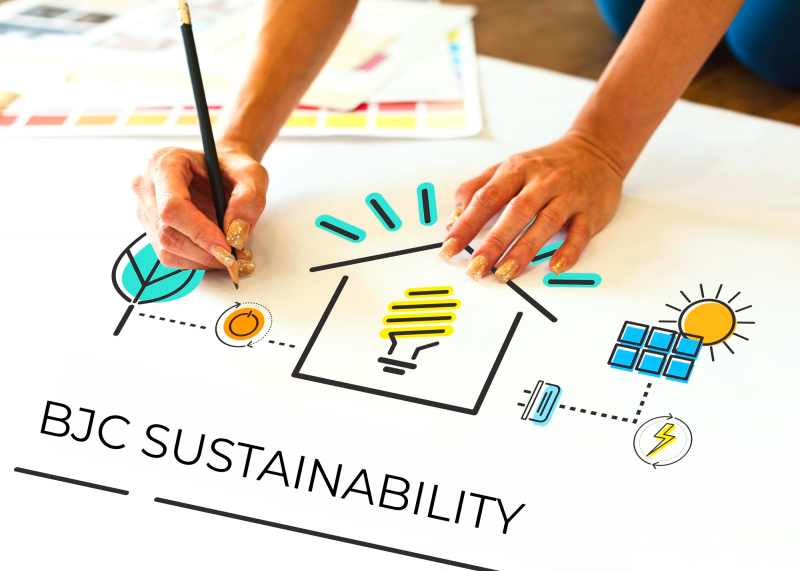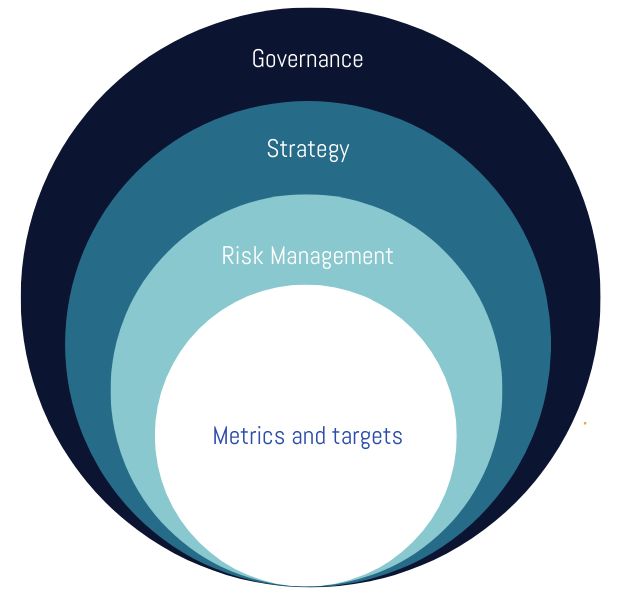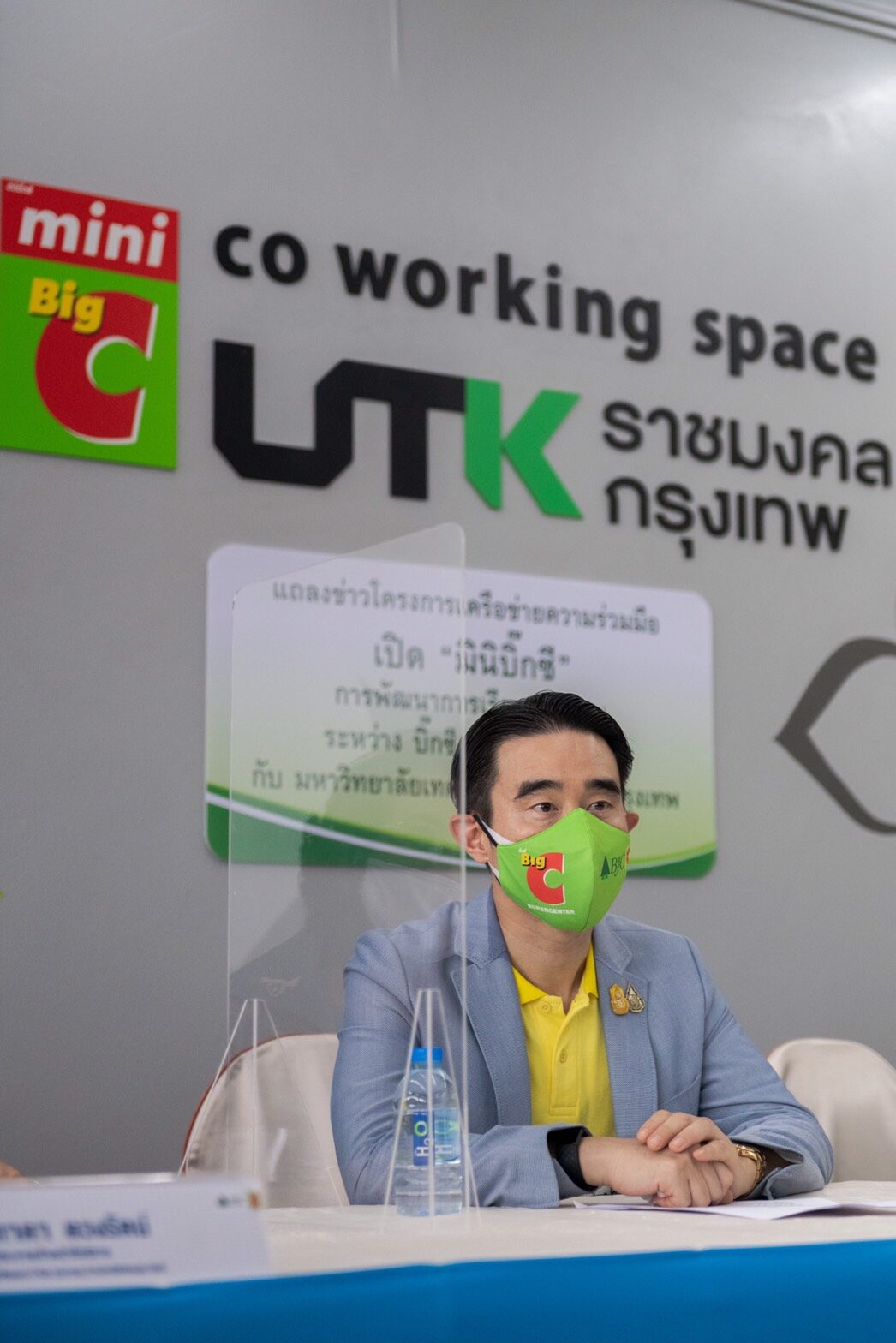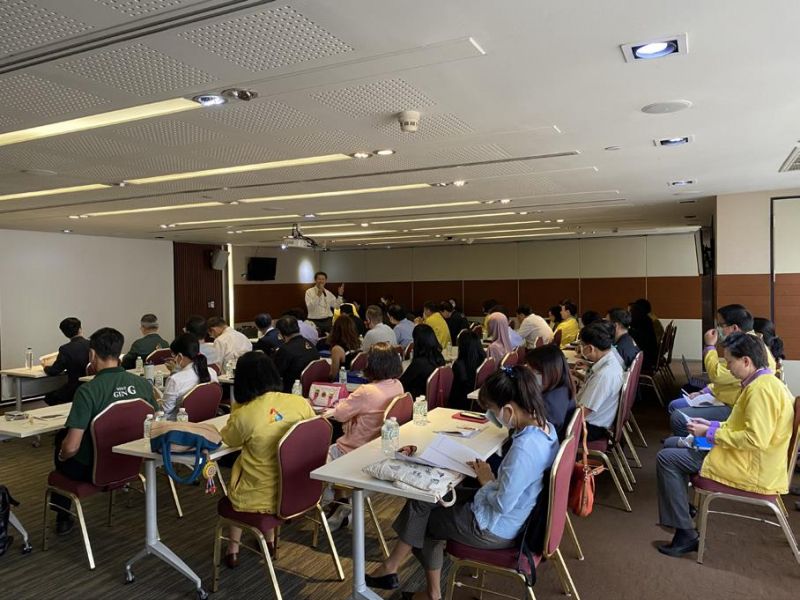
test

2 End hunger, achieve food security and improved nutrition and promote sustainable agriculture

goal 3

goal 4

goal 5

goal 6

goal 7

goal 8

goal 9

goal 10

goal 11

goal 12

goal 13

goal 14

goal 15

Goal 16
16.3: Promote the rules of law and the national and international levels and ensure equal access to justice for all.
16.5: Substantially reduce corruption and bribery in all their forms
16.7 Ensure responsive, inclusive, participatory and representative decision-making at all levels
16.b: Promote and enforce non-discriminatory laws and policies for sustainable development

Goal 17
CLIMATE CHANGE
GHG EMISSIONS REDUCTION TARGETS
| Long-term Targets | FY2032 |
| Reduce Emission (Scope1 & 2) per revenue from base year (2021) by | 15% |
| Reduce Emission (Scope 3) per revenue from base year (2021) by | 10% |
| Net Zero by | 2050 |
Energy is an essential aspect to life and all living organism on the planet, and is a fundamental operational driving force for companies like BJC, utilized throughout operations and controlled subsidiaries’ value chain, enabling the sourcing, manufacturing, transporting and selling of quality products and services to all valued customers. However, as a consequence of these processes, environmentally harmful Greenhouse Gases (GHG) are generated from combustions process, emitting GHG into the global atmosphere, casting various negative consequences to the earth’s natural systems, leading to diverse negative economic, environmental and social implications to BJC’s operations, through disrupt supply chain flow, resource availability, and increase occurrence and severity of natural disasters, damaging facilities and assets, and surrounding ecosystems and communities, potentially violating community’s human rights to movement and residence, as they are impacted by climate-related risks, which is forecasts to intensify as global energy demand continue to increase to meet growing global population, and increase middle-class. Despite the 4% global energy demand decline in 2021 represents the largest energy decline since World War II, and the largest ever absolute decline, driven by the continued outbreak of COVID-19, the International Energy Agency (IEA), predicts that “as COVID-19 restrictions are lifted and economies recover, energy demand is expected to rebound by 4.6%, pushing global energy use in 2021 to 0.5% above pre-COVID-19 levels”, as such, effective energy management is urgently needed, and remain to be an imperative aspect to global companies, to actively manage.
BJC acknowledges the risks associated with climate change and its ramifications towards operations and corporate reputations from poor management, striving to align emission reduction to the Thailand Alternative Energy Development Plan 2018-2037. At the same time, BJC, is aware of the urgency to mitigate climate change, noting that despite global energy demand decrease as a consequence of COVID-19 is a favorable outcome, it is short-term and insufficient to address the prolonged global climate issue, for this reason, BJC recognizes the opportunities to adapt business operations to serve customers in the new market environment, through the integration of effective energy management initiatives, and have always remain committed throughout 2022 to develop, implement and integrate climate change considerations and initiatives throughout the value chain, continuing to foster good energy management practices. Should BJC fail to conduct good energy management practices, it risks negatively contributing to the issue of climate change, creating a chain of transition and physical climate-related risks, such as increased financial costs, from investments into new technologies and innovations to manage climate related effects, and increase legal requirements, which may result in excessive financial expenses and fines if breaches.

Climate Change Strategy
To safeguard BJC operations against the adverse effects of climate change, and limit BJC negative contribution towards climate change, BJC has adopted a sustainable business practice, guided by the corporate wide Climate Change Strategy, integrating environmental and social considerations into all operations. The Company aspires to become a green industry through implementing the following initiatives:
|
1 |
|
2 |
|
3 |
|
Educate and Raise Awareness Among Employees About Climate Change
|
Conduct Assessment to Identify Opportunities and Risk to Planned Work to Appropriately Address Climate Change, by Integrating Climate Change Risk into Corporate Risk Management and Conduct Risk management and Assessment through BJC's Central Computer Network |
Prioritize BJC's energy consumption by increasing the proportion of clean energy consumption to reduce greenhouse gas emission
|
Climate change strategy and climate related target approved by the Sustainable Development Committee, and overseen by the Sustainability Sub-Committee, is applied to all employees, encouraging strategic mitigation and adaptation to BJC’s business operates. Thereby, it ensures BJC’s business resilience both in current and new market environment. This is achieved through, establishing corporate-wide ambitious climate targets, assessment, budget, and responsibilities to implement the Climate Change Strategy. BJC further provides knowledge training and fostering awareness about climate change amongst employees, integrates climate change considerations into the company’s enterprise risk management program to consider risks and opportunities associated with climate change. Furthermore, BJC has integrated sustainability and climate-related incentive into the CEO and president’s performance assessment.
Climate Change Risk and Opportunities Identification and Assessment
BJC has various operational plans to assist in maintaining and mitigating the impacts of climate change. BJC supports the United Nations Framework Convention on climate change to limit the average global temperature increase to less than 2 degrees Celsius, trying to limit under 1.5 degrees Celsius. BJC is also committed to disclose information in accordance with guidelines by the Task Force on Climate-Related Financial Disclosure (TCFD), established by the Financial Stability Board (FSB) in response to the Paris Agreement. This complies with a four-core framework, namely, Governance, Strategy, Risk Management, and Metrics and Targets, which is a reliable and clear report on climate-related financial risks assessment and reporting. It also gives advice on how to focus climate-related risks and opportunities management and communicate to BJC’s Stakeholders.
|
Core elements of recommended climate-related financial disclosures
|
|
 |
Governance |
| The organisation's governance around climate-related risk and opportunities. | |
| Strategy | |
| The actual and potential impacts of climate-related risks and opportunities on the organisation's businesses, strategy and financial planning. | |
| Risk Management | |
| The processes used by the organisation to identify, assess and manage climate-related risk. | |
| Metrics & Targets | |
| The metrics and targets used to assess and manage relevant climate-related risk and opportunities. | |
The scenario analysis focuses on scope 1 and 2 emissions, since it is represents direct and indirect control BJC has on its emissions. Beyond this, it should be noted that BJC also extends assessment to cover the scopes of scope 3 emissions, extending from the key supply chains of packaging, consumer and modern retail to other supply chains.
|
Scope 1 Direct GHG Emissions |
Detail |
||
|
Mobile combustion |
GHG emissions resulting from the burning of fossil fuels in mobile sources that are owned or controlled by the reproting company such as vehicles, airplanes, ships, and trains. It includes the combustion of fuels like gasoline, diesel, and aviation fuel. |
||
|
Stationary combustion |
GHG emissions from the burning of fossil fuels in stationary sources that are owned or controlled by the reporting company like power plants, industrial boilers, residential heating systems, and commercial furnaces. This includes the combustions the combustion of fuels such as coal, oil, natural gas, and biomass. |
||
|
Fugitive emissions |
GHG emissions that occur during the production, processing, transportation, storage, and use of fossil fuels or other industrial processes that are owned or controlled by the reporting company. These emissions can come from leaks in air conditioning system, pipelines, storage tanks, or equipment's. |
||
|
In boundary waste treatment |
GHG emissions that occur during the process of waste and wastewater treatment that are owned or controlled by the reporting company. |
||
|
Other direct emissions |
Other emissions include emissions from certain industrial and agriculture processes. |
||
|
Scope 2 Indirect GHG Emissions |
Detail |
||
|
Perchased electricity |
GHG emissions from the generation of perchased electricity that is consumed in its owned or controlled equipment or operations. |
||
|
Perchased stream |
GHG emissions from the generation of perchased stream that is consumed in its owned or controlled industrial processes. |
||
|
Direct & Indirect GHG Emissions |
FY2019 |
FY2020 |
FY2021 |
FY2022 |
Target for FY2022 |
|
 |
Direct GHG Emissions (Scope 1) (Metric tonnes CO2 equivalents) |
483,234 |
416,548 |
502,707 |
506,849 |
511,946 |
|
Intensity (Metric tonnes CO2e per Operation) |
415.15 |
288.27 |
317.37 |
304.78 |
307.85 |
|
 |
A. Indirect GHG Emissions (Scope 2): Location-based (Metric tonnes CO2 equivalents) |
715,128 | 603,447 | 616,037 | 608,933 |
614,423 |
|
Intensity (Metric tonnes CO2e per Operation) |
614.37 |
417.61 |
388.91 |
366.17 |
369.47 | |
 |
B. Indirect GHG Emissions (Scope 2): Market-based (Metric tonnes CO2 equivalents) |
729,841 | 628,811 | 652,211 | 618,065 | 650,503 |
|
Intensity (Metric tonnes CO2e per Operation) |
627.01 |
435.16 |
411.75 |
371.66 |
391.16 | |
| Total Data Coverage (as % of Denominator) | 87.69 | 87.58 | 89.98 | 91.37 | ||
|
Direct Greenhouse Gas (GHG) Emissions (Scope 1) |
Indirect Greenhouse Gas (GHG) Emissions (Scope 2) |
|
|
|
|
|
|
Metric Tonnes CO2 Equivalents |
||
Scope 3 GHG Emissions (Indirect emissions within the value chain)
In 2022, BJC increased the importance of Scope 3 GHG emission management, as BJC continued to transition towards a more sustainable operations. As such, in order to increase corporate understanding, BJC conducted training for all BU, enabling a coherent understanding of scope 3 emission sources for a more accurate categorization and data collection for BJC to develop reduction initiatives.

In 2022, BJC expanded the scope of its GHG scope 3 calculation and develope a centralized GHG emission data collection template across each of the 15 categories using a combination of revenue estimates and production data, enabling BJC to appropriately develop reduction initiatives in alignment with the corporate target to reduce 10% of scope 3 emissions by 2032. This target is also cascaded to each respective BU to achieve a common goal.
| Breakdown of Scope 3 Categories (tCO2e) | FY 2021 | FY 2022 | Target for FY2022 | |
 |
Category 1: Purchased goods and services | 186,236 | 6,176,779 | |
 |
Category 2: Capital goods | 5,743 | ||
 |
Category 3: Fuel and energy-related activities | 207,816 | ||
|
|
Category 4: Upstream transportation & distribution | 153,548 | ||
 |
Category 5: Waste ganerated in operations | 90,379 | ||
 |
Category 6: Business travel | 4,172 | ||
 |
Category 7: Employee commuting | 32,193 | ||
 |
Category 8: Upstream leased assets | 1,557 | ||
 |
Category 9: Downstream transportation & distribution | 37,744 | 6,508 | |
 |
Category 10: Processing of sold products | |||
 |
Category 11: Use of sold products | |||
 |
Category 12: End of life treatment of sold products | 50,366 | ||
 |
Category 13: Downstream leased asset | 67,641 | 103,920 | |
 |
Category 14: Franchises | 3,610 | ||
 |
Category 15: Invesments | |||
| Total | 291,621 | 6,836,591 | 9,096,176 | |
For emissions calculation methodology and exclusions available in BJC’s GHG Accounting Manual 2022.
External Collaborate
BJC recognizes that solving climate change problem cannot be accomplished alone, So BJC collaborates with government and non-governmental organizations to carry out activities related to car bon footprint analysis, emission reduction and managing the impacts of global warming such as Thaibev, Thailand Greenhouse Gas Management Organization (TGO), and Mahidol University etc.
Highlight Activities
MINI Big C SHOWCASE STORE
The store showcase environmentally-friendly technology integration into Big C operations, significantly reducing GHG emissions, in addition to serving as an entrepreneurial platform for university students to experience professional working experience, through internships, allowing for the application of learned theories into a real working environment, gaining valuable real world experience for future careers, all while serving and meeting the customized needs of surrounding communities.
The store showcase environmentally-friendly technology integration into Big C operations, significantly reducing GHG emissions, in addition to serving as an entrepreneurial platform for university students to experience professional working experience, through internships, allowing for the application of learned theories into a real working environment, gaining valuable real world experience for future careers, all while serving and meeting the customized needs of surrounding communities.

The store applies a close-loop service approach, applied through various technologies to reduce negative environmental impacts form its operations. These technologies include,
- Micro-channel Heat Exchange (MCHE) refrigerators, which increase cold by 30%, while reducing refrigerant by 30%. The fridges are also 11 kg lighter, allowing for easier maneuverability, safeguarding employee health and safety.
- Automatic Lighting and Air Conditioning system, which is only operational when employees and customers are present in the store.
- Electronic shelf label system , heat map camera and people counting camera, monitor door station and IP camera, Panasonic display and digital signage, solar roof top for mobile, notebook charging and solar street lights, temperature detection with facial recognition.
Furthermore, beyond the environmental benefit the showcase store presents, BJC also expects the store to serve as a platform for students, encouraging the development of new products and services, such as packaging, and branding to elevate products and services quality to certify for standards such as FDA approval and Thailand Industrial Standards Institute (TISI) Standards. BJC will offer distribution channel, sell and promote developed products within the showcase store, and prioritize local products, famous for the region, another channel to create income for local agricultures.
At present, the store offers over 5,566 products SKU, ranging from fresh, dry foods, bakery, condiments, small electronics, stationary, and serves Wawee coffee. The showcase store also offer a one of a kind unique Co-Working Space and other inclusive services such bill payment, phone top-up, deposit/withdrawal finance, and parcel delivery, while continuously offering and promoting Big C’s key differentiator to offer diverse products selection at a reasonable price to satisfy all customers.
Examples of products developed as a result of students surveying over 100 surrounding communities include;

CLIMATE PROTECTION AND ENERGY EFFICIENCY AWARENESS TRAINING
BJC continue to foster a sustainable culture throughout the organization, aiming to elevate all employee’s knowledge and awareness about climate change and energy efficiency. This is conducted through the climate protection and energy efficiency awareness training organized regularly through various channels such as in-person sessions, events and online.
BJC continue to foster a sustainable culture throughout the organization, aiming to elevate all employee’s knowledge and awareness about climate change and energy efficiency. This is conducted through the climate protection and energy efficiency awareness training organized regularly through various channels such as in-person sessions, events and online.
At RUBIA INDUSTRIES LTD.,

Held knowledge sharing session for employees about the measures to reduce energy where possible throughout the production facilities, such as turning off lights at certain times, setting air conditioning at an optimal temperature, establishing default sleep mode and implement check and repair scheme for leakages, this increases employee awareness to the importance of energy saving.







